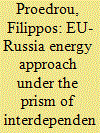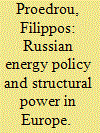|
|
|
Sort Order |
|
|
|
Items / Page
|
|
|
|
|
|
|
| Srl | Item |
| 1 |
ID:
167237


|
|
|
|
|
| Summary/Abstract |
Three main drivers underlie states’ intent to expand gas supply: energy security, geopolitics and climate goals. Such considerations also drive Greece’s expansive gas policy, but come with significant caveats. First, pipeline politics entails geopolitical costs and inflated anticipated gains. Second, while gas supply has yielded energy security for Greece, its cost-effectiveness is contentious. Third, the gas option obscures the transition to smart, clean energy sources and systems. A rational actor model within a rationalist-weak cognitivist framework can account for Greece’s gas policy. Yet, its limited success points to the need for a clean energy policy promising higher climate, energy and geopolitical gains.
|
|
|
|
|
|
|
|
|
|
|
|
|
|
|
|
| 2 |
ID:
080525


|
|
|
|
|
| Publication |
2007.
|
| Summary/Abstract |
This essay aims to analyse and interpret the EU-Russia approach in the energy sector under the prism of interdependence. It seeks to account for both the increasing cooperation among EU member-states and Russia as far as security of supplies is concerned, but also provides a sound explanation for the steady clashes between the two sides. For this reason, we use the terms sensitivity and vulnerability to refer to the position that each side holds on bilateral energy matters and, accordingly, to the actions it is capable of taking to resolve its problems. This model of interdependence provides a profound understanding of the bifurcated relationship between the EU and Russia and interprets both its cooperative and conflictive elements.
|
|
|
|
|
|
|
|
|
|
|
|
|
|
|
|
| 3 |
ID:
186129


|
|
|
|
|
| Summary/Abstract |
Energy transitions have been framed in environmental-economic terms, which shaped their scale and design. A strategic frame has emerged, however, with strategic energy security and geopolitical considerations penetrating governmental rationalities. An analysis of strategic framing allows advancing the debate on energy transitions, opening up unexplored avenues for their upscaling and unpacking critical linkages between national policy goals. In the case of Greece, although the strategic framing has started informing governmental rationality, the energy transition is still framed predominantly in environmental-economic terms. Thus, Greece continues to miss out on the opportunities the strategic framing of energy transitions presents for consolidating the country’s energy security and geopolitical stand.
|
|
|
|
|
|
|
|
|
|
|
|
|
|
|
|
| 4 |
ID:
116364


|
|
|
|
|
| Publication |
2012.
|
| Summary/Abstract |
This article concerns itself with the agenda, the instruments, and the goals of public diplomacy (PD). Taking into account the current state of PD that concentrates predominantly on forging cultural and educational links and promoting values, but not policies, it refocuses PD in two substantial ways: driving it, first, to focus on the most significant global issues and, second, to employ profound discursive processes. The emphasis then shifts to how PD can strengthen the global public sphere with regard to the profoundly political and critical issues of the present era. It argues in favour of strategic discursive PD and suggests ways to enhance both the legitimacy and efficiency of states' foreign policies on the handling of the Greek economic crisis and the issue of economic governance.
|
|
|
|
|
|
|
|
|
|
|
|
|
|
|
|
| 5 |
ID:
158048


|
|
|
|
|
| Summary/Abstract |
This article discusses and critically evaluates the impact of the Russian gas strategy through the theoretical lens of power. I delineate different kinds of power and discuss within which forms of power the Russian gas strategy analytically falls. In doing so, I move away from simplistic understandings of ‘hard’ and ‘soft’ power in energy politics and focus on the discussion of structural power, exploring agenda-setting functions, the rules of the game, regulatory issues, economic parameters, and the impact of globalising markets. I conclude that these factors have suppressed Russian structural power and the success of Russian energy policy in Europe.
|
|
|
|
|
|
|
|
|
|
|
|
|
|
|
|
| 6 |
ID:
152935


|
|
|
|
|
| Summary/Abstract |
The paper argues that Russia’s foreign policy vis-à-vis Ukraine and Turkey severely compromises its gas diplomacy. In utilizing the concept of issue salience, it attempts to show how, by means of prioritizing geopolitical benefits in both cases, Russia has failed to serve its energy security goals in two distinct ways. Firstly, it has not managed to resolve transit-related impediments to its export strategy, by both failing to break transit dependence on Ukraine and damaging relations with prospective transit state Turkey. Secondly, it has jeopardized its customer base in two significant markets. This brings severe repercussions not only for its energy industry but also for its grand strategy. The paper thus proceeds to suggest ways in which Russia’s energy and geopolitical interests can come to be served together, rather than undermine each other, as is currently the case. This is essential if Russia is to retain its political clout and international standing, given its strong dependence on energy-born revenues.
|
|
|
|
|
|
|
|
|
|
|
|
|
|
|
|
|
|
|
|
|